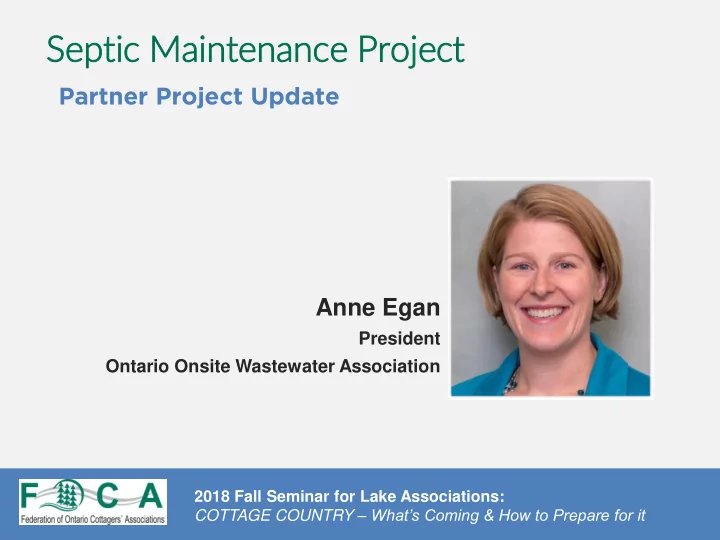

Septic Maintenance Project Partner Project Update Anne Egan President Ontario Onsite Wastewater Association 2018 Fall Seminar for Lake Associations: COTTAGE COUNTRY – What’s Coming & How to Prepare for it
Exploring Successes, Challenges, and Lessons Learned with Municipal Re-inspection Programs for Residential On-site Wastewater Systems in Ontario z FOCA AGM Saturday, October 27, 2018
z Outline Onsite sewage systems in Ontario Project Background The Study - Research Goal and Team Members Case Studies University of Guelph Work Preliminary Findings – Benefits & Issues Preliminary Lessons Learned
z Onsite Sewage Systems Onsite sewage systems are a vital and permanent component of rural infrastructure
z Onsite Sewage Systems Onsite sewage systems simple, reliable, robust, but: Lack of maintenance and aging infrastructure Impact on water resources
z Septic System Maintenance in Ontario Septic system maintenance Mandated by the Ontario Building Code (OBC) Section 8.9 for all systems Typical maintenance activities: Solids removal from septic tank Pump repair/ replacement Treatment unit maintenance Leaching bed flushing/repair/maintenance
z Septic Re-inspections in Ontario Mandatory Re-Inspections Only in Source Water Protection areas and areas within 100m of Lake Simcoe shoreline, tributaries, rivers and ponds Every 5 years Principle Authority is responsible Principal Authorities are responsible for conducting inspections occur for: Third-party certificates of compliance may also be acquired to meet requirements Discretionary Re-Inspections Any Principle Authority can establish a re-inspection program
z Provincial Guidelines for Inspections Phase I Non-intrusive Avoids disturbance to the system as a whole May be sufficient for establishing compliance If not, intrusive, Phase II assessment is required Phase II More detailed inspection, typically intrusive Activities depend on system characteristics May include sludge measurements, sewer camera, excavation, load testing, dye testing, etc.
z Other Programs: USA Compliance based inspection programs Minnesota, Pennsylvania, Arizona, Massachusetts, California, Others Typically required at time of Property Transfer True property value Money is changing hands – mechanism for repair/upgrades Inspector training and certification to ensure consistency
z Project Background Re-inspection programs Why are they being done? How is the program implemented? Is the program effective? How to evaluate efficacy? Costs? Existing Programs Variable and inconsistent One size does not fit all, but can we benefit from sharing information?
z The Study FOCA initiated Effectiveness of existing programs What is working? What is not? Arm FOCA members with knowledge Assist local councils in developing effective programs
z Study Team Members Individuals Affiliation Terry Rees, Executive Director Federation of Ontario Cottagers’ Associations Anne Egan, President Ontario Onsite Wastewater Association Liz Huff, Director Rural Ontario Municipal Association Theresa McClenaghan, Executive Canadian Environmental Law Director & Counsel Association Sarah Minnes, Research Associate University of Saskatchewan John Fitzgibbon, Professor University of Guelph Hugh Simpson, Adjunct Professor Cameron Curran, MSc(Planning) Student Brendan Eidner, MSc(Planning) Student Taylor West, MSc(Planning) Student
z Research Goal The goal of this research is to highlight promising practices and rural policy implications for municipal re-inspection programs for residential on-site wastewater systems in Ontario.
z Case Studies Township of Rideau Lakes Township of Leeds and Thousand Islands Municipality of Callander Township of Tiny More to come in Winter 2019 in southwestern Ontario (still to be determined)
z University of Guelph Contributions Literature Review by 3 Research Assistants Jurisdictional scan on the following areas of focus: Summary of current legislation surrounding water wells in Ontario Review of septic re-inspection programs Bylaws surrounding water and wastewater systems
z Student Thesis Project Cameron Curran, MSc Candidate, University of Guelph “Best Practices for Onsite Wastewater System Inspections, Maintenance and Record Keeping in the Lake Simcoe Watershed” Review of septic re-inspection programs, record keeping practices & system owner maintenance Sewage system Owner interviews Facilitate workshop with industry professionals Provide a final report to Ontario Ministry of Environment, Conservation and Parks
z Preliminary Findings – Common Benefits Education of residents Protection of human health Protection of water quality Cost effective way to reduce risks related to onsite wastewater systems Preserving household assets / minimizing risks of failure of major home system
z Preliminary Findings – Common Issues Proving the effectiveness/ success of a program Refusal of compliance Legal action effectiveness/ costs? Financial burden for repair/ replacement of systems
z Preliminary Lessons Learned Homeowner education one of the primary benefits Improve buy-in by: Scheduling appointments with residents Working with residents, providing information sessions etc. Different models of the programs can all be successful Determine the right model for your municipality Set objectives for the program Set parameters to measure success
z Next Steps Finalize literature review (November 2018) Complete written case study reports (March 2019) University of Guelph student thesis work (August 2019) Check out our webpage for all project outputs: http://rplc-capr.ca/septic-maintenance-project/ Other Resources: http://www.omafra.gov.on.ca/english/ www.oowa.org environment/facts/sep_smart.htm
Recommend
More recommend